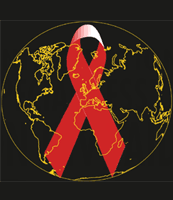This year marks 25 years since the world first heard the acronym ‘AIDS’. Since 1981, we have witnessed major achievements in the response to the epidemic - from individuals and local communities up to the global level.
This year, World AIDS Day is dedicated to the theme of ‘accountability’. It is a theme that embraces responsibility for one’s personal conduct, solidarity between individuals and groups in different countries, and pledges made by major global organizations and national governments. In many cases, accountability boils down to whether commitments are being honored and promises being kept. In this regard, there are encouraging indications that the world is willing to address the ongoing challenge posed by the epidemic.
Governments worldwide committed themselves to accelerating their responses to the epidemic at the 2001 United Nations General Assembly Special Session on HIV/AIDS (UNGASS), a commitment that was reaffirmed at the United Nations World Summit in 2005 and again at this year’s High-Level Meeting on AIDS. In the years following UNGASS, there has been strengthened action at all levels, with increased leadership and commitment, more resources and intensified delivery of HIV prevention, treatment, care and support.
Despite this progress, however, approximately 40 million people are living with HIV today, an estimated 8,500 new infections occur daily and only one in ten people have access to treatment and prevention services, including prevention of mother-to-child transmission and access to antiretroviral therapy. There can be no room for complacency when it comes to HIV and AIDS. Strong action is required, particularly through massively expanded and intensified prevention efforts alongside activities to expand access to treatment, care and support. Otherwise, the epidemic will continue to spread and threaten hard-won development gains and future prospects for sustainable development.
For its part, UNESCO undertakes its work in the context of a broader effort organized through UNAIDS to move towards Universal Access to prevention, care, treatment and support. The priority that UNESCO has given to education is based on evidence that education contributes towards the knowledge and personal skills essential for the prevention of HIV, and protects individuals, families, communities and nations from the impact of AIDS. Beyond this, education can create the conditions of understanding and tolerance that contribute to reduced stigma and discrimination against people living with HIV.
To reflect the priorities of Universal Access and UNESCO’s role within the UNAIDS program, earlier this year I initiated a revision and updating of the UNESCO strategy on HIV and AIDS. This is being conducted through an extensive consultative process throughout UNESCO and, when completed at the end of this year, will provide the framework for guiding our actions in the years ahead. The overarching goal of the strategy remains to ensure that Member States have the most effective response to HIV and AIDS in all sectors relevant to UNESCO’s mandate. The priority is to prevent the spread of HIV through education and to protect the core functions of the education system from the worst effects of the epidemic, drawing on the strengths and resources of all UNESCO sectors.
In 2004, UNESCO raised its level of engagement by establishing its leading role in EDUCAIDS, the Global Initiative on Education and HIV & AIDS, supporting comprehensive education sector responses.
In these and other ways, UNESCO is addressing the challenges presented by the HIV and AIDS epidemic. I urge everyone to use the occasion of this year’s World AIDS Day to renew our collective commitment by holding ourselves accountable for the success of UNESCO’s response to HIV and AIDS.
Some of the events that UNESCO is organizing throughout the world include:
Kenya: Conference on HIV-positive teachers in Eastern and Southern Africa
Morocco: Web portal discussion on HIV and AIDS
Thailand: Guinness World Records attempt to create the World’s Longest Condom Chain
Russian Federation: Contemporary Arts Project
Russian Federation: Launch of “HIV/AIDS and Human Rights: Young People in Action” Kit
Uganda: Launch of Toolkit for Youth in Africa on Theatre, HIV and AIDS

No comments:
Post a Comment